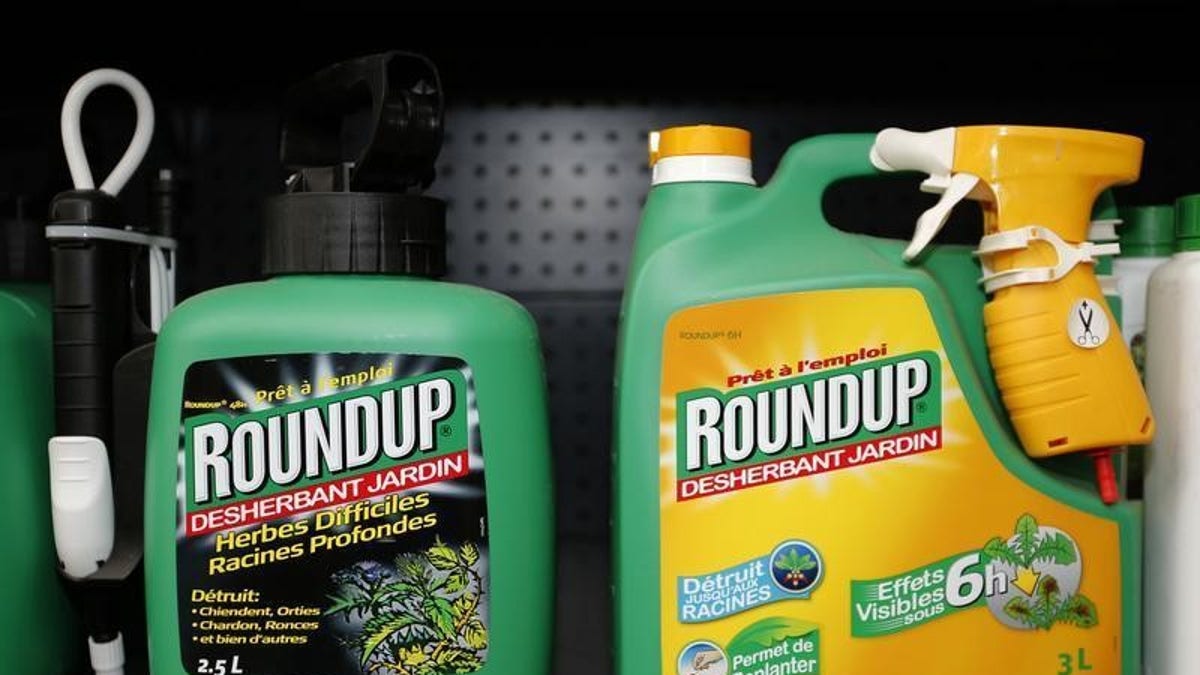
Monsanto's Roundup weedkiller atomizers are displayed for sale at a garden shop at Bonneuil-Sur-Marne near Paris, France, June 16, 2015. REUTERS/Charles Platiau (Copyright Reuters 2015)
Contradictory advice from two European-based agencies about the cancer risk posed by the weed-killer glyphosate offers clarity on only one message: that uncertainty is inherent in the scientific process.
Glyphosate - brought into use by Monsanto in the 1970s and used in its top-selling product Roundup - is "unlikely" to cause cancer according to the European Food Safety Authority (EFSA), yet "probably" does, according to the International Agency for Research on Cancer (IARC).
Both are likely to be right, specialists say, but only in their own contexts. And for consumers, the key distinction to understand is the difference between hazard and risk.
"At face value the opinions of IARC and EFSA appear to be contrary, but the reality is they are not directly comparable," said Peter Jenkinson, a genotoxicologist and managing director France & UK of the chemicals consultancy CEHTRA Ltd.
That's partly because the evidence the two agencies considered was not the same - EFSA only assessed glyphosate, while IARC looked at glyphosate alone and at products it's used in - and partly because they used different methods to draw conclusions.
Just as importantly, however, it is because they approach their task from different stances - one being hazard identification, the other being risk assessment.
Jenkinson noted that while EFSA used a "weight of evidence" approach in its review, published last week, IARC, which issued its glyphosate classification in March, takes the view that if one study has a positive result it can outweigh negative studies, even if there are more negative than positive ones.
EFSA also analyzed some studies conducted by industry groups that were not part of IARC's review. IARC says it looks solely at evidence that has already been published and can be reviewed by independent scientists.
Monsanto welcomed the EFSA review, saying in a statement that its findings that glyphosate is unlikely to pose a carcinogenic hazard to humans "align with conclusions from regulatory agencies around the world".
In contrast, it said, IARC's review "selectively included and interpreted data, followed non-standard toxicological procedures, and only reflects the opinions of a select group of scientists".
DIFFERENT FRAMEWORKS
David Coggon, a professor of occupational and environmental medicine at Britain's University of Southampton, says "it's important to bear in mind that EFSA and IARC operate within different frameworks".
"The level of precaution that is applied in the face of scientific uncertainty depends on value judgments, and is not a scientific question."
Both agencies note that there is some so-called "genotoxic" evidence that exposure to glyphosate can alter or damage DNA in animal or human cells, but this evidence is then viewed in different contexts.
For IARC, a World Health Organization (WHO) agency whose lists of probable and possible cancer risks include high-temperature frying, shift working and mobile phone use, the glyphosate review was about the assessment of a potential hazard.
In other words, IARC is tasked with highlighting anything that might in certain conditions, however rare, be able to cause cancer in people.
EFSA, on the other hand, is concerned with real life risks and whether, in the case of glyphosate, there is evidence to show that when used in normal conditions, the pesticide poses an unacceptable risk to human health or the environment.
EFSA's role is to guide policymaking in the European Union, and it describes itself as an independent agency funded by the EU budget that operates separately from the European Commission, European Parliament and EU member states.
IARC's activities are mainly funded by the regular budget contributions paid by its 25 member states, which include the United States, Australia and many European countries.
"Which conclusion or opinion is 'correct' depends on your point of view on the methods used by the two agencies," said Jenkinson. "For me, the EFSA methodology is the one that is more scientific, pragmatic and balanced."
BATTLE CONTINUES
The campaign group Greenpeace described the EFSA's review on Friday as a "whitewash", and the environmental action group the Natural Resources Defence Council (NRDC) accused EFSA of conducting a process "that relies on an industry-supplied scientific review".
"The WHO IARC's review is a much more robust, scientifically-defensible and public process involving an international committee of non-industry experts," said NRDC spokeswoman Jennifer Saas.
Yet critics of IARC, which last month classified the consumption of red meat as probably carcinogenic to humans, say its hazard identification approach is becoming meaningless for consumers, who struggle to apply its advice to real life.
"The big problem with IARC ... is that what they're doing is looking around for any evidence that might enable them to say that under particular circumstances this thing could be a carcinogen," said Colin Berry, emeritus professor of pathology at Queen Mary University of London.
Berry, who declares an interest as having acted as a consultant for Monsanto, says that since glyphosate is strictly controlled in agricultural uses and available in only very weak solutions for regular consumers, its risk is low.
"But these reports worry people," he said. "And I think the process has lost its usefulness if all it's doing is generating worry."
